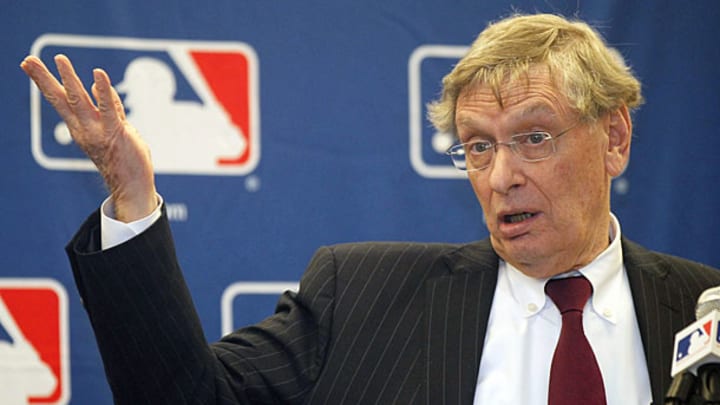Miami New Times spurns Bud Selig in unhinged editorial

Bud Selig's controversial tenure as commissioner apparently didn't win him any friends at the Miami New Times. (AP)

By Cliff Corcoran
The Miami New Times, the newspaper that broke the story on Anthony Bosch's Coral Gables-based Biogenesis clinic and its association with various active major leaguers, published an editorial on Thursday announcing that it would not cooperate with Major League Baseball, refusing to hand over any records beyond what it has already made publicly available on its web site.
The editorial, penned by editor Chuck Strouse, cites the paper's own journalistic ethics and integrity as well as a previously unreported Florida Department of Health criminal probe into Bosch as reasons for denying baseball access, but for nearly half its length, the piece devolves into an angry rant against a century's worth of institutional corruption in baseball. Strouse goes as far back as the 1919 Black Sox scandal, in which, he writes, Shoeless Joe Jackson was "unjustly banned" while skinflint owner Charles Comiskey "walked free . . . and even had the White Sox stadium dedicated in his name."
Strouse goes as far as to say that "one of our most significant motives for denying baseball" is Marlins owner Jeffrey Loria, whom Strouse refers to as "the pudgy art collector." Strouse cites a recent article in TheAtlantic describing Loria's stewardship of the Marlins as "the biggest ongoing scam in professional sports," and condemns commissioner Bud Selig directly for his role in Loria's purchase of the team, citing past accusations of racketeering on Loria's part and the fact that he "hornswoggled $515 million in public backing" for Marlins Park.
Strouse's outrage over Loria and the Marlins is justified, but, to my mind, he would have been better off resting on his solid legal and ethical basis for not cooperating with baseball. Instead, he paints the New Times refusal as a punishment for all of baseball's past failings, claiming "if only Loria's misdeeds were at issue, we might still give Selig the records. But he represents an organization with a long history of getting things wrong."
Strouse goes on to cite baseball's "horrible, racist history" even after integration, invoking the late owners Calvin Griffith and Marge Schott, and the fact that Mark McGwire, who, Strouse writes, set "the record with 66 home runs in a season in 1999," [as anyone with access to Baseball-Reference.com knows, McGwire set the record with 70 in 1998, and he hit 65, not 66, the next year] was allowed to "keep playing" even after "reporters spotted drugs in his locker and wrote about it." Never mind that the identified supplement, androstenedione was legal in the game and an over-the-counter supplement at the time, or the cognitive dissonance of refusing to cooperate with Baseball on a performance-enhancing-drug investigation because Baseball was soft on PEDs in the past.
Strouse, who again condemns Selig individually as unworthy of receiving the paper's cooperation because he "was the commissioner of baseball during this morass," goes on to admit that, just one month ago, he "opposed both the newspaper's lawyer and the article's author, Tim Elfrink, and wanted to give the records to baseball."
"I hoped to see A-Roid [sic] and the others punished and believed walking the ethical line was the only way to make that action happen," writes Strouse after stepping down from his soap box of moral outrage. Only then does he delve into the legitimate journalistic reasons for his denial.
What Strouse wrote is clearly a very honest look at his thought process on this issue, but as moral grandstanding goes it's flawed, messy, plays loose with the facts and does more to undermine the paper's decision than to support it.
When Strouse points out that turning over the Biogenesis records would betray a source who "fears for his safety" and "would be sending the wrong message to future anonymous sources who might want to give us records," he's on firm ground, but those concerns don't merit mention until he's spilled several hundred words on his rant against baseball and Selig.
New Times
